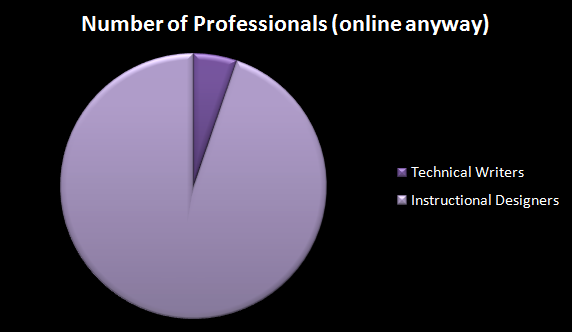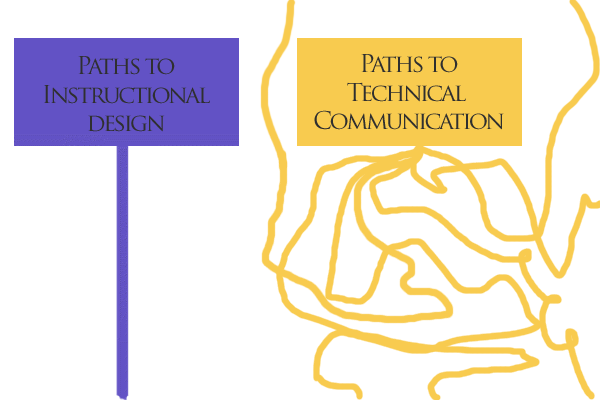Instructional Design Versus Technical Communication
Today I was trying to learn more about elearning when I stumbled across Tom Kulman's Rapid eLearning Blog and was sucked into the content for the next fifteen minutes. The visuals on his blog are intriguing. They're the kind of visuals I wish I had on my blog. They remind me a little of the visual artistry on The Oatmeal.
Even more genius, he promises a 47 page ebook on elearning if you sign up for email delivery of his posts. And here's the shocker: he has 64,243 readers, though he only posts about once a week, it appears. His site is a good model of how to design a successful blog, but c'mon, 64,000 elearning readers? Really? I don't even have 3,000 readers, and I have been blogging nearly five years. I doubt that there are thousands more technical writers surfing around the Internet looking for content but just not finding me. Search for practically anything tech comm related and you're bound to stumble into my blog sooner or later.
Which leads me to wonder, are there thousands upon thousands more instructional designers out there than technical writers?

Maybe instructional designers include the whole gamut of teachers who want to include an online component in their courses, or something.
At any rate, I brought this question up in a team meeting, and my trusty colleague Derek said he had an observation about elearning. Derek said,
From what I've seen, most people in elearning have degrees in instructional design. They have some kind of official training in their field, whereas the same isn't true for tech comm. Tech comm has much more diversity with backgrounds.
In other words, the difference (somewhat exaggerated) of paths leading to instructional design versus paths leading to technical writing looks like this:

This poses an intriguing question: Why do most instructional designers have degrees in elearning, whereas most tech writers lack degrees in tech writing? I asked the question on Twitter and was swamped by the responses:
techwriterkai @tomjohnson Coming to TW from different venues, backing into the job and loving it - aka I found my dream job while parking :-)
2moroDocs @tomjohnson Wow. Interesting responses. We're as varied as the topics abt which we write. I have BA in Eng/Tech Comm, from way back in '82.
cseftekhar @tomjohnson I got into #techcomm //because// of the degree offered at @ECUEnglish. Probably would be teaching now instead. :)
kirstyt @tomjohnson IDs all wanted to go into learning/ed/teaching?? Come from teacher ranks? TWs more diverse background, no one path to #techcomm
rjhoughton @MNTechWriter @tomjohnson My degree too - English Language & Literature BA, professional/technical writing minor.
paharvey @tomjohnson I think practical experience trumps education in #techcomm. Specific degree is icing, but not the cake.
JohnHedtke @kemulholland @EdMarshall @tomjohnson I'll bet! Sharon Burton's ABD in anthro and Spanish herself and does great questions similarly.
JohnHedtke @tomjohnson I think because we came to tech writing from many different venues, frequently backing into the job and discovering we loved it.
RayGallon @tomjohnson France has many programs at master level. Most in linguistics departments.
MNTechWriter @tomjohnson my BA is in English with an emphasis in tech writing. Dept. Chair was progressive.
techykate @tomjohnson like others, i came into techcomm by accident. I have a BA/MA in American Studies.
RayGallon @tomjohnson #techcomm is an eclectic profession. Most of us are humanists, not technologists. That's why specific degree is difficult.
John_Ellam @tomjohnson @dfarb My Accounting degree taught me I didn't want to be an Accountant & I ended up doing #TechComm for Accounting Software Co.
kemulholland @EdMarshall @tomjohnson one of the best #techcomm folks I know majored in anthropology & minored in Spanish. He asks great questions!
walterhanig @tomjohnson There wasn't a TC curriculum way back when. Fell into TC based on skills honed in other careers (SW design, pgm mgt)
mycowz @tomjohnson Most people don't aspire to be tech writers, they typically end up as one, needing only the ability to "write well."
dekkere @tomjohnson When deciding on grad school, I found many more instructional design programs than #techcomm. An ID degree is more available.
PattyBlount2 @tomjohnson Even TWs can't agree on what should be taught in degree programs (i.e., debates on TECHWR-l) #techcomm
alanbowman @tomjohnson My degree is in culinary arts. #techcomm is my 3rd career, after 15yrs cooking and 12yrs UNIX systems admin.
dfarb @EdMarshall @kemulholland @tomjohnson my BA is in English Literature, my MA (many, many years later!) is in #techcomm
dfarb @tomjohnson also in some places, such as the UK, there is a lack of specific university level education in #techcomm
dfarb @tomjohnson many reasons: many tech writers are in their 2nd careers; many employers still think "anyone can write"; #techcomm
dmnguys @tomjohnson Most of us seem to slide sideways into TC. Getting a degree or certificate in the field is often (not always) a second thought
EdMarshall @kemulholland @tomjohnson Anecdotally most exp. tw I've met in NE have other degrees than techcomm. Mine is in Music Ed!
kemulholland @tomjohnson Can't speak for others, but I didn't plan to enter #techcomm. My degree is in electronics. This is my 2nd career.
markfidelman @tomjohnson Great question. Only recently did Tech Comm have certification so maybe evolution into tech comm degrees?
larry_kunz @tomjohnson Many tech writers come into the field from other walks of life -- probably more so than in instructional design.
Interesting. I had no idea so many people followed my sporadic tweets, but this must have hit a special note with technical communicators. The trend in the answers is that no one sets out to be a tech writer, you just fall into it. And even if you wanted to be a tech writer, there are few degree programs in tech comm. And even if there are degrees in tech comm, you probably already have writing skills, so why do you need to get a degree in what you already know?
If this is the case -- that any background can lead to tech writing -- then it's no wonder that many people today feel that "anyone can write," and so marginalize the value of technical writing.
Maybe certification will push us more into a common path to the profession. Still, I don't think that technical writing will ever be a career young students aspire to embrace. Writers usually start out as dreamy English majors, and eventually come around to technical writing when they need money.
Thoughts on eLearning
I taught writing at the university level for four years, so I have some experience with teaching, but I'm new to elearning. From what I could gather reading Kulman's blog, the basics of instructional design are fairly intuitive. Create active versus passive learning, give the user control, help the user apply the learning while he or she is learning, select content using the 80/20 rule -- these are my immediate takeways. Not sure I would need a PhD in instructional design for this, but surely the same could be said of tech comm.
One thing is for sure, I don't spend nearly enough time thinking about how my users will learn the material I create. I spend too much time gathering and organizing and refining the information, and then complaining that people don't read the manual. They don't read the manual because most people don't learn by reading manuals. They learn through visual illustrations, through exploration and experimentation, and by having friends explain the application in friendly ways. This gap -- overlooking how people learn -- is my biggest deficiency as a technical writer.
I'm not sure why instructional design and technical communication are separate (though related) disciplines. Both need each other. The instructional designer needs access to the content that users need to learn. The technical communicator needs to present the content in a way that users can learn it.
About Tom Johnson

I'm an API technical writer based in the Seattle area. On this blog, I write about topics related to technical writing and communication — such as software documentation, API documentation, AI, information architecture, content strategy, writing processes, plain language, tech comm careers, and more. Check out my API documentation course if you're looking for more info about documenting APIs. Or see my posts on AI and AI course section for more on the latest in AI and tech comm.
If you're a technical writer and want to keep on top of the latest trends in the tech comm, be sure to subscribe to email updates below. You can also learn more about me or contact me. Finally, note that the opinions I express on my blog are my own points of view, not that of my employer.

